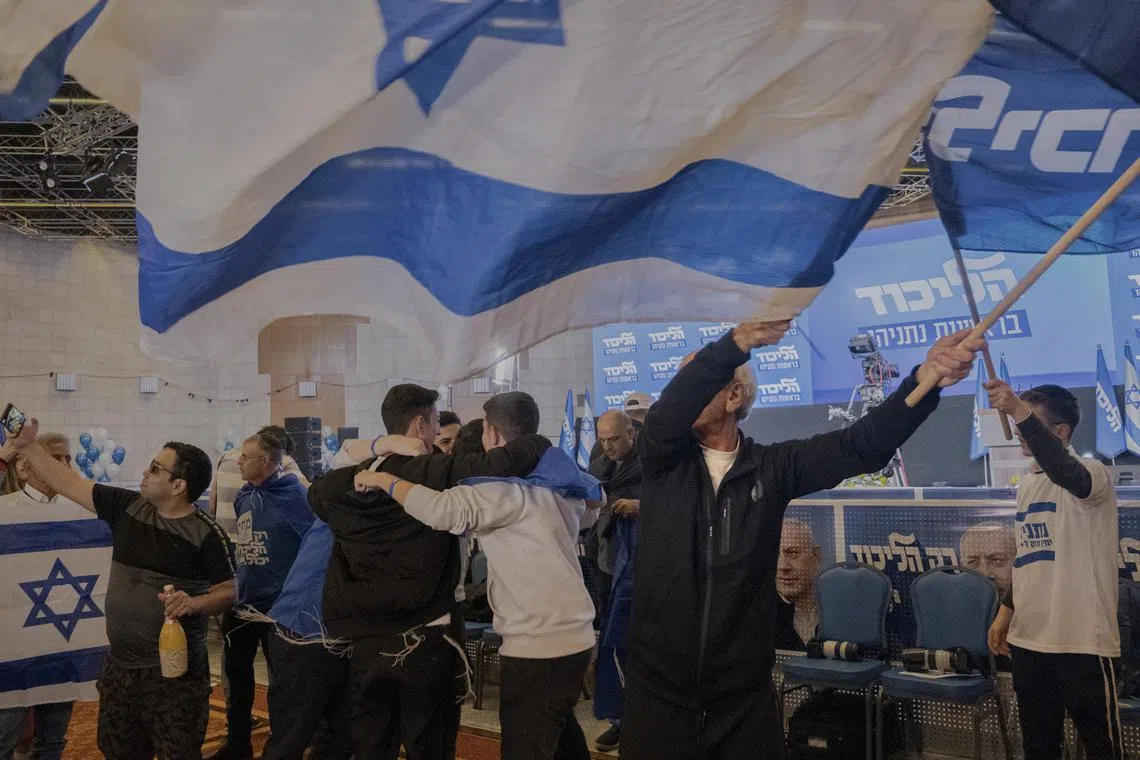As Israel’s far-right nears power, Palestinians feel a pang of fear
Sign up now: Get ST's newsletters delivered to your inbox

Supporters of returning premier Benjamin Netanyahu's Likud party celebrate in Jerusalem, on Nov 1, 2022.
PHOTO: NYTIMES
Follow topic:
JERUSALEM – For Jewish Israelis, the election this week of a far-right alliance has left some joyful, and others with a sense of bewilderment and foreboding.
But to Palestinians in the occupied territories and within Israel’s Arab minority, it has summoned a different and contradictory blend of emotions: fear, indifference and, in some cases, a sense of opportunity.
Barring a last-minute change of heart, Benjamin Netanyahu, the returning prime minister,
Their settler leaders variously seek to end Palestinian autonomy in parts of the occupied West Bank, expel those they deem disloyal to Israel and make it easier for soldiers to shoot at Palestinians while on duty.
One of those leaders, Itamar Ben-Gvir, until recently hung a large photograph of an extremist Israeli who shot dead 29 Palestinians in a West Bank mosque in 1994 on his wall at home. He still keeps a picture on display there of Meir Kahane, an extremist rabbi who sought to strip Arabs of their Israeli citizenship.
To some Palestinians, the far right’s rise can scarcely make things worse for them.
Israel has long operated a two-tier legal system in the occupied West Bank that tries Palestinians in military courts and Israelis in civilian ones; rarely punishes violent Israeli settlers; and already mounts near-daily raids in Palestinian areas – raids that have helped make this year the deadliest in the West Bank since at least 2015.
Palestinians in the West Bank are subject to restrictions on their movement, almost all of them unable to drive into Israel, while neighbouring settlers freely come and go. Many struggle to access their private land close to settlements and risk attack when they do.
In Gaza, Palestinians live under an Israeli-Egyptian blockade
For that reason, some hope Ben-Gvir’s arrival even brings opportunity: Some have long considered the Israeli state indistinguishable from the likes of Ben-Gvir, and they hope the world will now see what they see.
But to many Palestinians, a far-right government, studded with lawmakers with a history of antagonising Arabs, has no silver lining. It is simply terrifying.
“I’m afraid of a very dark future,” said Issa Amro, an activist in Hebron, in the southern West Bank. “Ben-Gvir is very fanatic and extreme and, for me, a fascist. He is a big threat.”
With Ben-Gvir in government, some Palestinians fear even more impunity for settler violence and even greater restrictions on their movements. They also fear that Ben-Gvir’s calls to deport people who oppose the state of Israel are a code for the expulsion of Palestinians.
To Amro and the other residents of Hebron, Ben-Gvir is a known quantity – and not in a comforting way.
Ben-Gvir lives in a settlement in Hebron and has a history of confrontation with local Palestinians. A video from 2015 showed him involved in an attack on a Palestinian shop in the Old City of Hebron, pulling a clothes rack to the ground.
The mosque massacre in 1994, whose perpetrator, Baruch Goldstein, was once feted by Ben-Gvir in his home, occurred a few hundred metres away.
“I’m afraid that fanatic settlers will feel more empowered” by Ben-Gvir’s rise, Amro said. “I’m afraid that more Baruch Goldstein massacres will happen.”
The mood in Sheikh Jarrah, a neighbourhood of east Jerusalem where settler movements seek to evict Palestinian residents, was also apprehensive.
Ben-Gvir frequently visits and champions the settlers of Sheikh Jarrah, even setting up a tent there that he declared his temporary office. His provocative presence exacerbated tensions in the neighbourhood that contributed to the outbreak of an 11-day war in May 2021 between Israel and militants in Gaza.
Last month, he returned to Sheikh Jarrah, brandishing a pistol and telling police officers to fire at nearby Palestinians.
“Friends, they’re throwing rocks at us,” Ben-Gvir said, pulling out his handgun. “Shoot them.”
Ben-Gvir says he has become more moderate in recent years. He tells his followers to chant “Death to terrorists”, replacing their previous chant of “Death to Arabs”. He still calls Kahane “a hero” but distanced himself from the rabbi’s most extreme positions.
“I have no problem, of course, with the minorities here,” he recently said in a voice message to The New York Times, after declining an interview.
Some Palestinians, although fearful, predict that Ben-Gvir will do little that Israel hasn’t already done to Palestinians living under either occupation or as a minority within the state of Israel.
“Our day-to-day won’t be that different,” said Nour Younis, an activist living in Tel Aviv, Israel. “We might pay the price, sure, but we already have been paying the price with any government.”
Some Israelis, both Jewish and Arab, nevertheless hope this moment could also bring about a better future. Jewish-led leftist parties suffered a near-wipeout in the election – and to claw their way back to influence, some hope that they will be forced to work more closely with, and establish greater empathy for, the parties and narratives of the Palestinian minority.
Others also hope the far right’s rise will bring greater international attention to Israel’s worst excesses, making them harder for the world to ignore, said Younis, the activist.
“I look at the bright side – finally, Israel’s real face will show,” she said. “When this face is exposed to the international community, I hope they finally understand that there really isn’t a true partner for peace in Israel.”
But others were less optimistic.
The world would still lack empathy for Palestinians, with or without Ben-Gvir, said Maha Nakib, a Palestinian activist in Lod, an Israeli city with a recent history of inter-ethnic tensions.
“They don’t really care,” Nakib said. “Our eyes aren’t blue and our hair isn’t blond like the Ukrainians.” NYTIMES

